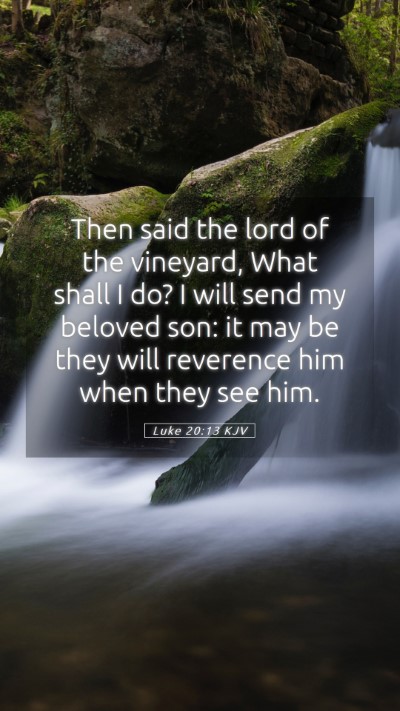Understanding Luke 20:13
In Luke 20:13, Jesus presents a parable about a vineyard owner and his ungrateful tenants. This verse reflects deeper themes that resonate throughout Scripture regarding stewardship, authority, and the rejection of God's messengers. Below we explore the meaning of this verse by synthesizing insights from established biblical commentators like Matthew Henry, Albert Barnes, and Adam Clarke.
Verse Analysis
Luke 20:13: "Then said the lord of the vineyard, What shall I do? I will send my beloved son: it may be they will reverence him when they see him."
Contextual Background
Context is crucial in understanding this passage. In the preceding verses, Jesus recounts the story to illustrate Israel's history of rejecting prophets. The vineyard symbolizes Israel, while the owner represents God. The tenants signify the religious leaders, highlighting their failure to be faithful stewards.
Commentary Insights
- Matthew Henry: Henry emphasizes the owner's patience and the gravity of sending his beloved son. This act signifies God’s ultimate grace and the hope that they might repent and show respect. He notes that the reference to the beloved son aligns with the New Testament understanding of Jesus as the Son of God.
- Albert Barnes: Barnes points out that the lord's willingness to send his son demonstrates divine love and longsuffering. He contrasts the expected reverence from the tenants with their actual rejection, illustrating humanity's consistent rebellion against divine authority.
- Adam Clarke: Clarke discusses the implications of this verse as a foreshadowing of Christ’s rejection. He explains that the sending of the beloved son encapsulates God's plea for humanity to acknowledge His authority, portraying the prophecy of Christ’s mission and the inevitable persecution he would face.
Theological Implications
The act of sending the beloved son carries immense theological weight. It speaks to the concepts of:
- Divine Authority: God's sovereign right to send messengers and expect a response.
- Grace and Patience: The persistent outreach of God to humanity, despite repeated rejections of His messages through prophets.
- Foreshadowing Christ's Mission: The parable not only describes the past but also points to the forthcoming sacrifice of Jesus and the rejection he would face.
Application for Believers
Understanding this verse inspires several reflections for believers today:
- Stewardship: Believers are called to faithfully manage the responsibilities given by God, recognizing that they have been entrusted with His message.
- Response to Authority: This passage encourages individuals to reflect on their attitude towards God’s authority and the messages He sends.
- Recognition of Christ: The duty to honor and reverence Christ as God's beloved Son is paramount, requiring believers to consider how they respond to His teachings.
Additional Cross References
- Isaiah 5:1-7: The song of the vineyard, which establishes the metaphor of Israel as God’s vineyard.
- Matthew 21:33-46: A parallel parable illustrating the rejection of the son by the tenants in the vineyard.
- John 3:16: The declaration of Jesus as God’s beloved Son, emphasizing the significance of His coming.
Conclusion
Luke 20:13 serves as a powerful reminder of God’s love, the seriousness of human rebellion, and the significance of acknowledging and revering Christ. By closely examining this verse, readers gain profound insights into the nature of God’s relationship with humanity and the expectations He holds for His followers.


